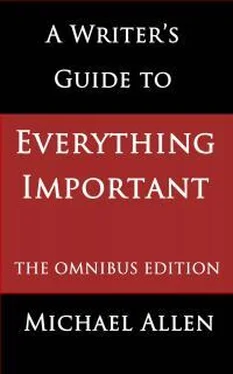It is worth noting that, at about that point in time, Watt and a few others operated by sending out circulars to upcoming writers, setting out what services they could offer, and touting for business. Compare and contrast that situation with that of the present day, when it is the writers who have to approach the agents and describe (in effect) what they can do for the agent.
It is also clear that, by around the turn of the century, the system of remunerating agents by allowing them to take a percentage of the total royalties was also in place. Watt apparently began his agency by charging an hourly rate, much like a lawyer; but he found that all too often his clients ‘forgot’ to pay him, and he switched to the arrangement whereby all royalties were first paid to him; he then deducted his commission and passed on the rest to the writer.
As to the rate of commission… Well, even then the figure of 10% had come to be recognised as the standard rate for agents to charge. Precisely how this came about is impossible to say, but my guess is that it was probably a nice round figure which was already being charged by theatrical agents and similar professionals. And it made the arithmetic so much simpler, didn’t it? Anyone could understand 10% and work it out in their head. Whereas if the figure was 8.5% it would all get so much more complicated. No, no: 10% it was.
Oh but surely, I hear you say, if there were lots of start-up agents touting for business and sending out circulars and such, surely they would be in competition with each other, and would be offering lower percentages in order to attract custom. Weren’t they?
No.
And why not?
Because the fix was in, that’s why not. Competition of that sort was not welcome, and any new agent who tried that particular dodge would be taken on one side and have the facts of life explained to him.
This kind of price-fixing by mutual agreement was almost certainly illegal then and definitely is now. Capitalist countries have laws which try to ensure that the consumer gets a product at a fair price – that price being found by competition. But in practice manufacturers tend to make secret deals to keep the prices up.
An example of this kind of chicanery can be found in the auction business. In a decision adopted on 30 October 2002, the European Commission found that Christie’s and Sotheby’s, the world’s two leading fine-arts auction houses, had breached European Union competition rules by colluding to fix commission fees and other trading terms between 1993 and early 2000.
In publishing, the US Department of Justice recently (2012/13) accused Apple and five major publishers of price-fixing, and won. Most of the publishers just admitted the obvious truth, struck a deal, and paid a whopping fine. Penguin, for instance, paid $75 million to settle the matter. Apple did not cave in because they’re different, right? Not exactly above the law, but, well… You know Apple.
So, you ask, why doesn’t the Department of Justice, or the European Commission, or someone, take a look at why literary agents somehow or other all charge the same commission? Answer, because literary agents constitute a pathetically tiny piece of world business, and nobody in authority would worry their head for two minutes about what agents do. They’re too small to fuss about, and if writers are dumb enough to put up with it that’s their problem.
But, nevertheless, the fix was in almost from the beginning, and it still is. Agents do not compete on price. A rate of 10% was standard, in the UK and the US, until around 1970, when the business began to hot up. As we shall see. And by 1970 the number of literary agents operating in London had risen to 70. There were plenty of them in New York, too.
2.2 The nature of the writer/agent relationship
We have reached (roughly) the year 1970 in our short historical survey of literary agents, so this is a good point to pause and consider a number of aspects of this trade (I don’t think it can qualify as a profession).
From the beginning, the practitioners of the trade defined themselves as ‘agents’. And most countries, or US states, have laws about the relationship between agents (in a general, commercial context) and their principals; they also have a backlog of actual legal disputes which provide legal precedents for guidance. For example, Wikipedia has an article on Agency in English Law.
Few states, however, have laws relating to literary agents in particular.
A principal, by the way, is the person in charge. A principal is the person, or perhaps a company, who commissions the agent to act on his or her behalf in certain circumstances.
And the first thing that strikes me about the paragraph immediately above is that, for at least the last fifty years, the principal/agent relationship which operates in the book world has been precisely the reverse of what is considered normal in the rest of the business world.
A.P. Watt, you recall, touted for business. He went out of his way to advertise his services, and, if contacted by a writer, he undoubtedly did his best to convince the writer to commission him. He was the one in the weak position: the supplicant.
By 1970, that sort of attitude had already become a historic relic. It was now very much the writer’s task – and an extremely difficult one at that – to persuade the powerful and famous agent to accept the miserable unknown writer as a possible client.
The agent was the person (it was thought) who knew all the right people in publishing. She knew the editors, knew what they were looking for, had incriminating photographs of key personnel, et cetera. So the agent held all the cards. It was the writer who went along, cap in hand, tugging his forelock if male, and giving multiple curtseys if female, and tried to get the agent to give them the time of day.
Furthermore, it was commonly the case that, even if the writer was (grudgingly) taken on, the relationship might not last long. Unless some considerable success (in the shape of money) was soon forthcoming, the agent would send the writer a brief note saying, in effect, thanks but don’t bother sending me any more of your stuff because it obviously isn’t up to scratch.
Writers, if they somehow managed to get taken on to an agent’s books, would put up with considerable delay and even humiliation from their agent, because they knew full well how hard it would be to find another one. And, wisely or otherwise, writers were of the view that an agent was essential to get your foot in the door of publishing – from which, of course, limitless wealth and fame would result.
There are few occasions when this role of applicant is reversed to the normal agent/principal relationship: and one such is when the writer is a former US President.
In his recent memoirs, the New York agent Sterling Lord recalls that the first President Bush (George H.W.) interviewed at least one agent before he decided not to proceed with writing the traditional memoir of his years in office.
An earlier President, Lyndon Johnson, deputed a lawyer, Arthur Krim, to do the spade work for him in selecting a suitable agent; Sterling Lord was invited to attend an interview.
During the course of the interview, it was suggested that, for the honour of representing President Johnson, Lord should reduce his commission from the usual 10%. Lord politely declined to do so; it would, he said, be unfair to his other clients.
Having reviewed the situation, Lord decided that, given Johnson’s close association with the unpopular war in Vietnam, his memoirs would be tough to sell, particularly for the kind of advance that the President apparently expected. Furthermore, Lord already represented several clients who were strongly opposed to Johnson’s policies. So Lord withdrew his name from consideration as Johnson’s agent. This did not go down very well.
Читать дальше












